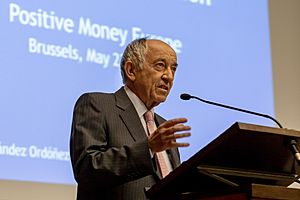Miguel Ángel Fernández Ordóñez facts for kids
Quick facts for kids
Miguel Ángel Fernández Ordóñez
|
|
|---|---|

Miguel Ángel Fernández Ordóñez giving a speech at a conference hosted by Positive Money Europe in Brussels (May 23, 2018)
|
|
| 68th Governor of the Bank of Spain | |
| In office 8 March 2006 – 11 June 2012 |
|
| President | José Luis Rodríguez Zapatero Mariano Rajoy |
| Preceded by | Jaime Caruana |
| Succeeded by | Luis María Linde |
| Personal details | |
| Born | 3 April 1945 Madrid, Spain |
| Political party | PSOE |
| Relations | Francisco Fernández Ordóñez (brother) |
| Alma mater | Complutense University of Madrid |
| Occupation | Economist |
Miguel Ángel Fernández Ordóñez (born 3 April 1945) is a Spanish economist and politician. He was a member of the Socialist Workers' Party. He is best known for being the Governor of the Bank of Spain. He is the younger brother of Francisco Fernández Ordóñez, who was also a politician. He is married to Inés Alberdi.
Contents
Early Life and Education
Miguel Ángel Fernández Ordóñez was born in Madrid, Spain, in 1945. He studied at the Complutense University of Madrid. There, he earned degrees in both Law and Economic Science. He also became part of a special group of government experts. These experts work on trade and economic matters for the state.
His Career Journey
Fernández Ordóñez held many important jobs in the Spanish government. He served as the Secretary of State for the Economy. He was also the Secretary of State for Commerce. For a time, he was an Executive Director at the International Monetary Fund. This is a big organization that helps countries with their money.
Important Roles
In 1992, he became the president of the Court of Defense of the Competition. This court helps make sure businesses compete fairly. From 1995 to 1999, he led the Commission of the National Electric System. This group managed Spain's electricity. Later, from 2004 to 2006, he was the Secretary of State for Internal Revenue. This role involved managing taxes. In March 2006, he joined the Bank of Spain. He became a counselor and a member of its main committee.
Leading the Bank of Spain
In July 2006, Miguel Ángel Fernández Ordóñez became the Governor of the Bank of Spain. This is a very important job. The Governor is in charge of Spain's central bank. He took over from Jaime Caruana.
During his time as Governor, Spain faced economic challenges. He warned banks to be careful with loans. This was because house prices had gone up a lot. He wanted to prevent problems in the housing market. By 2008, he asked banks to watch their money more closely.
He finished his term as Governor in June 2012. Luis María Linde then took over this important role.
Other Activities
- European Central Bank (ECB): He was a member of the Governing Council from 2006 to 2012. This council makes big decisions about money for countries that use the Euro.
His Ideas on Money
In 2018, Fernández Ordóñez shared his ideas about how banking could be better. He thought the money system could be made safer. He suggested that people could have bank accounts directly at the central bank. This idea is called a Central Bank Digital Currency.
He believed this would make the financial system more stable. It would also mean less need for some rules. He explained that money kept at the central bank is very safe. It would not need special protection from the government. This could help prevent banking problems. He thought citizens would not have to worry about their money.
See also
 In Spanish: Miguel Ángel Fernández Ordóñez para niños
In Spanish: Miguel Ángel Fernández Ordóñez para niños

